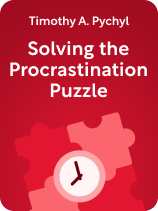

This article is an excerpt from the Shortform book guide to "Solving the Procrastination Puzzle" by Timothy A. Pychyl. Shortform has the world's best summaries and analyses of books you should be reading.
Like this article? Sign up for a free trial here.
How does procrastination affect your mental and physical health? How does putting off a task result in stronger negative emotions?
The desire to avoid negative emotions often drives procrastination. Timothy A. Pychyl warns that this rarely works out the way we expect it, because procrastination doesn’t make us happier, nor does it make us feel physically better.
Take a look at the mental and physical effects of procrastination on health below.
It Results in More Negative Feelings, Not Fewer
Pychyl explains that when you know you should be working on a task you’ve delayed, you probably feel mixed emotions about it. One of the most common is guilt (which you feel when you know you’re doing something that conflicts with your sense of what’s right or wrong for you).
Additionally, one of the effects of procrastination on health is that you’ll to feel an array of negative emotions later, when you have to deal with the consequences. Pychyl contends that deferring a task often results in more negative emotions than you’d experience if you’d just gotten started on the task, no matter how unpleasant it is. For example, as many undergraduates learn, if you wait to write a paper until the night before it’s due, you’ll spend the night feeling anxious, harried, or frantic—and the next day feeling sleep-deprived and regretful.
(Shortform note: Other experts agree with Pychyl that procrastination just leads to more negative feelings. Procrastination author Fuschia M. Sirois, a psychologist with whom Pychyl has collaborated, explains that people prone to putting tasks off exercise less self-compassion, the ability to be kind to themselves even when they perceive that they’ve failed. Instead, they judge themselves harshly and think that their procrastination reflects a kind of personal failing. Understandably, this kind of self-evaluation is linked with higher stress levels. Sirois explains that if you can learn to practice self-compassion, you can reduce the negative emotions you feel about your procrastination and give yourself a better chance of actually changing the habit.)
It Takes a Toll on Your Physical Health
Research also shows that procrastination can have a harmful effect on your health and well-being. How is that possible? Pychyl explains that first of all, procrastination causes stress. (Just think of how stressful it is to write a paper the night before it’s due!) But stress isn’t just a feeling: Stress is a psychological, emotional, and physical reaction to the challenges you experience. Even when you create a stressful situation yourself by putting off until later something you should do now, that stress can have an impact on your body, and sometimes that impact can harm your health.
(Shortform note: Humans and other primates develop more stress-related health issues than other animals, as Pychyl points out. Scientists are starting to figure out why. In Why Zebras Don’t Get Ulcers, neuroendocrinologist Robert Sapolsky explains that all animals have a physiological response to stress, which helps them survive threatening situations. But in humans and other primates, this stress response gets activated even when there’s no immediate danger (like when we’re stressed about a task we’ve put off). Our bodies didn’t evolve to handle chronic stress, so it harms our cardiovascular and metabolic systems, depresses the immune response, and harms cognitive functioning—a compelling reason to stop stressing yourself out with procrastination.)
According to Pychyl, another reason that procrastination takes a toll on your physical health is that while putting off a few unpleasant tasks can seem harmless, procrastination isn’t so innocuous when it involves health-related tasks. Skipping gym sessions, delaying the start date for healthier eating habits, pushing back your bedtime, failing to find the time for doctor’s appointments, and delaying recommended health screenings all keep you from taking care of yourself to the best of your ability. Your health can suffer in the long run: After all, your blood pressure doesn’t care that you always intend to exercise more or that you have a plan to start a new diet next month.
(Shortform note: It makes sense that specific choices like skipping gym days can hurt your health. But it’s been difficult for researchers to sort out whether, overall, procrastination causes poor health or poor health leads to procrastination. A recent study investigated these relationships and ultimately linked the tendency to procrastinate now to a higher risk of poor health later. The researchers hypothesize that procrastination leads to depression, anxiety, or stress, and negative physical effects follow from there. They suggest trying cognitive behavioral therapy (CBT) to learn to translate long-term goals into short-term ones, manage distractions, and stay focused—helpful strategies whether you want to establish better work habits or start getting to the gym regularly.)

———End of Preview———
Like what you just read? Read the rest of the world's best book summary and analysis of Timothy A. Pychyl's "Solving the Procrastination Puzzle" at Shortform.
Here's what you'll find in our full Solving the Procrastination Puzzle summary:
- The real reason why you procrastinate
- How procrastination undermines your ability to live a happy, healthy life
- Practical advice for changing your relationship with your most dreaded tasks






